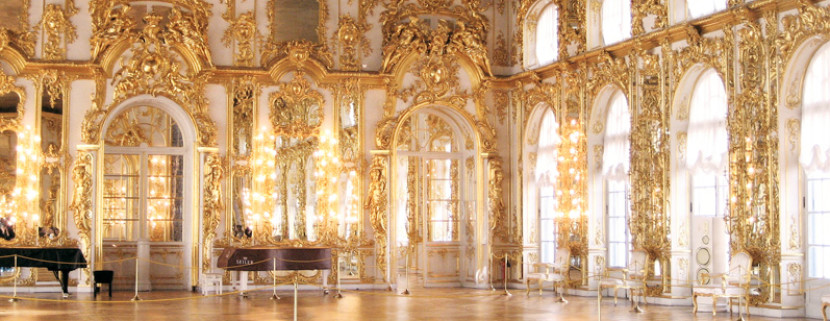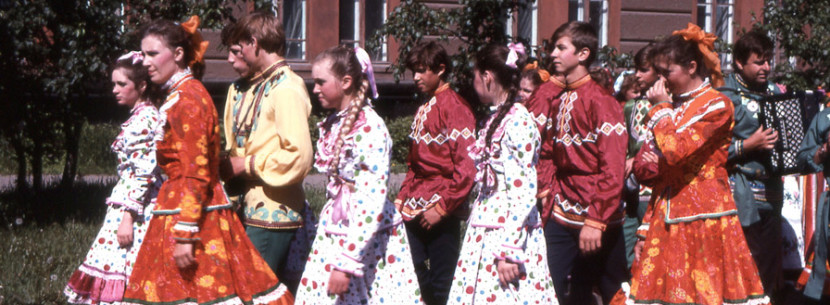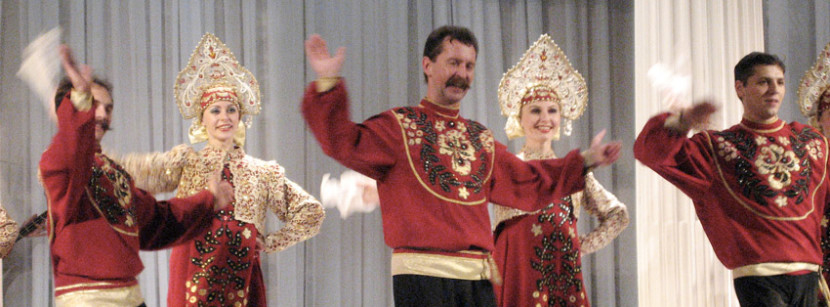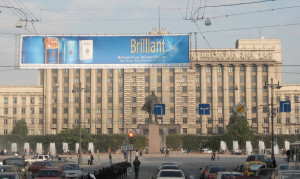Prologue: Why Russia?
Change Behind the Curtain — On the Home Front — Hooked — Spreading the Word
Images of Russia; why the programme started in 1989 and the reasons for the journeys; Russia’s communist past; a short autobiographical sketch; the things that lure people to Russia.
PART 1: A CRUMBLING SUPERPOWER: 1989
This section is based on the school ‘Goodwill Tour’ to the USSR in 1989, witnessing the failing Soviet regime first hand. It covers some basic geography and history, and relates many experiences.
Chapter 1. ‘The Sleeping Land’
Siberia — Igor — First Stop Khabarovsk — The Great Green Train — Timber, Timber, Everywhere — Irkutsk — ‘Time of Troubles’
The landscape, vegetation, and inhabitants of Siberia; the Trans-Siberian Railway and major cities; the people, as seen through fellow-travellers on the train – and many anecdotes and troubles.
Chapter 2. Moonlit Madrassas
Tashkent — Across the Desert — Trials by Night — Mythical Samarkand
The main physical characteristics and history of the desert lands of the south; the wonders of the legendary Silk Road cities of Tashkent and Samarkand – and more troubles!
Chapter 3. The Soul of ‘Mother Russia’
Beautiful Red — Home of the Tsars — Echoes of the Past – Grand Hotels — Capital Life — Confrontation
An overview of the history of pre-18th century Russia as seen through the Moscow Kremlin and Red Square; the city and its people in Soviet times
Chapter 4. Fading Splendour
Peter’s New Fortress — Royal Indulgences — Alexanders and Nicholases — Critical Times — A City of Contrasts — More Trials, More Magic —the End and the Beginning
Imperial Russia through its major palaces and the Tsars who lived there; the 1917 Revolution and the 1941 Siege of Leningrad; the city in 1989; the impact on the participants of the school tour.
PART 2: LIFE ON A TIGHTROPE: 1991
This section portrays the last days of the USSR and its demise, along with that of communism, as seen through the eyes of host families in Moscow and Leningrad in September 1991; contrasting journeys.
Chapter 5. To Go or Not to Go?
Hello Larissa — Goodbye Gorbachev — The Big Dilemma
A prologue to Part 2, outlining the attempted coup and the overthrowing of Gorbachev in August 1991 and the effect this had on the planned tour just one month later.
Chapter 6. Farewell Communism
A Capital Welcome — Hosts — Change in the City — Looking Back — Children’s Specials — Curtain Call
Moscow in 1991: our reception at the school; the reaction of the people to the fall of communism and the visible signs of this in the city; special children’s theatre in Russia.
Chapter 7. At Home in Leningrad
Turn around – In-House — At School — The Cradle of Russia — Farewell — Crimean Extension — Mid-air Fraternisation
The generally euphoric reaction to the fall of communism in St Petersburg and the Tsar fever hitting the city; living with families and spending time at school; visits to Novgorod and the Crimea.
Chapter 8. Different Perspectives
The Russians are Coming — New Horizons — Land of the Deep Freeze — Moving On
Four separate sections give a different view of Russia and its people: a Russian return visit to Australia; Tours to Pskov and Estonia; Russia in winter; the end of the school tours and start of the Arts Tours
PART 3: RUSSIA’S CULTURAL HEART
Part 3 looks at the way the country’s history and rich culture, particularly its literature, music, and art, provide the Russia of today with its solid foundation, and the ‘soul’ that is so important to its people.
Chapter 9. Rich Legacies
Where East meets West – Power Play – Keeping the Faith – Cultural Reflections
An introduction to Part 3, the chapter outlines Russia’s early history, shifts of power and the importance of the church, and the impact of these on Russian culture.
Chapter 10. The Power of the Word
Getting around the Language — The Cyrillic Alphabet – Soulful Authors — Revered Poets
Basic points about the language and the Cyrillic alphabet, and Russia’s major authors and poets, especially Tolstoy and Pushkin.
Chapter 11 ‘To Music’
Spirited Folk — Sublimely Vocal — Super-Symphonic — Lords of the Dance — Grand Union — Repression – New Mediums
What makes Russian music so special; styles and composers of Russian classical music; folk, choral, and instrumental music, ballet, opera and film – covered largely through descriptions of performances.
Chapter 12 The Artist
Palaces of Art — Mirrors of the Russian Soul — The Real World — The Person Within — A Social Conscience — Art in Conflct — Super-Statues — Alexander Polozov
Russian art is discussed by visiting the studio of a leading artist and discussing with him his view of Russia today and its depiction in his work, and by looking at his heritage: the galleries, patrons, and the key artists and works of different genres, from icons to the present.
PART 4: THE CHALLENGES OF THE NEW RUSSIA
Part 4 looks at the effects that the political and economic changes since 1991 have had on the country and the lives of its people, partly through their own eyes, and gives some views on the future. Most of this is covered anecdotally.
Chapter 13: Redefining a Country
Disintegration and Loss — Conflict — New Borders to Cross – Follow the leader
The effects of political change in Russia; the problems posed both by new states, and within Russia (Chechnya and terrorism); border procedures and breakdowns; and views on Vladimir Putin.
Chapter 14: The Price of Money
Learning the Hard Way — Winners and Losers — Rebuilding the Past — Home Sweet Home — Out on the road — Changing Schools — Shopping Spree
The changes brought by capitalism, both good and bad: the crash of 1997–8 and the effects on different age groups; changes in the countryside, housing, schools, and shopping.
Chapter 15: Inside Stories
Larissa — Natalia — Elena — The View from Pskov and Novgorod — Julia — Raisa — The Yaroslavl Professor
Russian people tell their own stories, covering not only the changes in their lives since 1991 and their views on Russia and president Putin, but also their memories of Stalin’s time and death, and the communist regime.
Chapter 16 Young Russia Speaks Out
Critical Teens — The Young Sophisticate — A Reticent Young Men — A Fiery Duo
The attitude of young people towards the new political system: a group of school students, and a comparison of attitudes of people in their early and late 20s – and reasons for the differences.
Epilogue: Where to from here?
External Perceptions — Internal Let-down — Taking Stock — The Crystal Ball
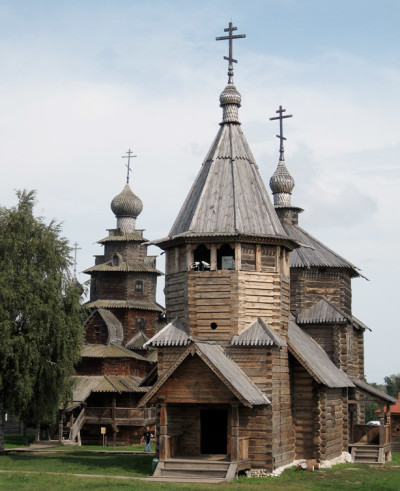 This draws together some of threads from the rest of the book and gives the author’s views on the major economic and political issues facing Russia and what its future might hold.
This draws together some of threads from the rest of the book and gives the author’s views on the major economic and political issues facing Russia and what its future might hold.
